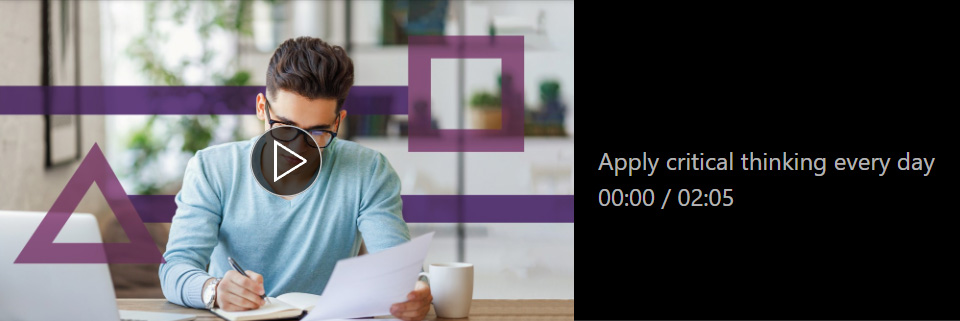Critical thinkers & problem solvers
Discover the benefits of developing your critical thinking and problem-solving skills.
Popular pages on the careers website
What employers want
Master problem-solving and critical thinking!
Employers value your ability to:
- Analyse and solve problems efficiently
- Use knowledge, facts, and data to find the best solutions
- Embrace innovative approaches for non-routine problems
- Question ideas logically and think creatively
- Reflect on experiences and make effective decisions
Reflect:
- Are you curious and questioning – able to challenge and analyse information?
- How can you show you use research and analysis to solve complex problems?
- How have you developed your critical thinking and research skills through your course?
In the next section you will see how you can develop this skill.
Develop your critical thinking and problem-solving skills
Here are some activities to enhance your critical thinking and problem-solving skills:
- Study: Take advanced courses in your field that require critical thinking and analysis, such as industry-specific or technical Masters programs.
- Volunteer: Engage in team activities that involve problem-solving, research, and data analysis. Look for opportunities within your course or current workplace.
- Networking: Seek advice from professionals in your field. Attend networking events, connect with experts in person or through social media, and learn how they have tackled similar challenges.
- Games: Challenge yourself with video games that sharpen critical thinking. Additionally, try puzzles like crosswords, Sudoku, jigsaw puzzles, chess, and board games.
Once you have started to consider how you can develop your skills, start to think about how you might be able to showcase them during your career journey.
Demonstrate your employability skills
You will be asked to provide evidence of your skills in job applications, CVs and interviews – articulating where, when, why and how successfully you have used your employability skills. Top tips:
- Start with noting down examples of your skills on our Employability Skills Checklist
- Keep this as a record to use when completing applications and preparing for interviews.
Reflect on your journey
- Identify the skills you're using in your studies.
- Record all your experiences (paid work, voluntary work, roles in clubs or societies, for example) using our Employability Skills Activity Sheet
- Maintain your skills audit for future reference.
- Pinpoint any challenging skills or qualities you are struggling to evidence.
- Take action to bridge any skills gap.
Check out our employability guide (perfect for new students) to unlock opportunities and more ideas to help you develop your employability skills.

How to best demonstrate your skills to employers
Be positive and relevant
- Give examples of the most relevant skills first from your job, internship or work experience
- Use confident language to describe your skills, for example, praise employers have given you.
- Better to focus on transferable skills than routine tasks on your CV, gained through part-time jobs.
Sell your skills in different ways
These are just a few examples:
- Social Media including a Linked-In Profile
- Networking opportunities
- CV, Covering Letters, Application Forms
- Interview and Assessment Centres
- Presentations
Think beyond common skills
Our Employability Skills are probably ones you are familiar with. But there are some you might not be familiar with, such as meta-skills. A meta-skill like a master skill – it's something that can help you in lots of different environments.
Think also about:
- Subject skills e.g. Software, use of Lab equipment or research methodology
- Talents and abilities e.g. Languages, drawing skills, athletic
- Personal qualities e.g. Calmness, tenacious, creative, supportive
Match skills to your employer
Research the employer – what is their company culture? Look on their website and see what their company beliefs are.
Look at the job description you have. You should be able to find some of the employability skills they are looking for.
Use the STAR technique to help you relate the employability skills into your answers and examples.
Resources
- Forge your own career path
- Why be Enterprising
- Psychometric Tests in Recruitment Processes
- Emotional Intelligence
- Writing a Reflective Log
Our experts have selected further Employability resources for you to use.
Speak to a Careers Adviser
Get guidance from our friendly team of Advisers.
Open to current students and Salford Alumni only.


